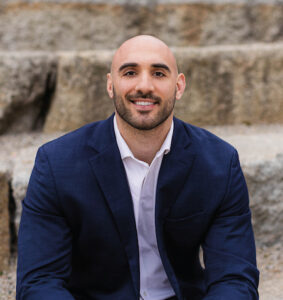Mike Cyr ’15
 DEGREES: B.S. in neuroscience; D.P.T. (doctor of physical therapy), University of New England; American Board of Physical Therapy Specialties (ABPTS) board-certified neurologic clinical specialist
DEGREES: B.S. in neuroscience; D.P.T. (doctor of physical therapy), University of New England; American Board of Physical Therapy Specialties (ABPTS) board-certified neurologic clinical specialist
JOB TITLE: Staff physical therapist and site lead of clinical excellence, as well as director of clinical education, Maine Strong Balance Centers; adjunct assistant professor, University of New England; registered Maine whitewater guide
FAVORITE TRINITY MEMORY: Many that come to mind: days on the Appalachian Trail with Quest, my summer abroad in Barcelona, every Spring Weekend, and the Halloween snowstorm of 2011. This constitutes many memories, but I will say just getting a box of jojos from Sam’s after a night at The Tap and eating them with my roommates on Crescent Street while we played Super Smash Bros. on Nintendo 64.
What do you do in your work?
In my primary role as a physical therapist, I treat patients with neurologic conditions, including brain injury, stroke, Parkinson’s, multiple sclerosis, vestibular disorders, balance impairments, and other neurodegenerative diseases. I try to establish a collegial relationship with my patients and help them reach their functional goals through a variety of exercise-based treatment modalities. I also serve as director of clinical education for my clinic and adjunct assistant professor at the University of New England, where I work with physical therapy students. I teach “Gross Anatomy” and “Disorders of the Neuromuscular System” and am involved with the placement and education of students on their clinical rotations.
What inspired you to become a physical therapist?
I had the mixed fortune of suffering a string of sports-related concussions at the same time I was doing my neuroscience coursework at Trinity. Personal experience and academic interest impelled me to learn more about neurorehabilitation as a field. I learned that physical therapists get more face time with their patients than almost any other health provider. With more time to ask questions, educate, and allay fears, you can build long-term relationships where it’s possible to promote a sense of agency in health and in life. It felt like the right way to do health care.
What do you enjoy most about your work?
Every day is different and presents endless challenges and endless learning opportunities. Many of my patients are facing existential injuries or diseases and are fearful of what the rest of their lives hold for them. Helping them to reengage with what gives them meaning in their lives is one of my greatest joys and privileges. It’s also incredibly rewarding to see the development of my students as they work to become competent and caring physical therapists. I love the layered nature of my work and the ways I am able to combine my different roles. Outside of the clinic, I’ve had opportunities to do health promotion work internationally with fellow PT and Trinity classmate Consuelo Pedro and to guide several adaptive whitewater rafting trips in Maine with former patients.
What challenges do you face?
My professional challenges typify some of the biggest challenges facing education and health care in the United States today. The rising cost of education is disincentivizing students from seeking careers in health care, and the rising cost of living is making it more difficult for students to complete their training. Additionally, the country’s population is living longer, and the need for providers who are skilled in addressing chronic and age-related illnesses is ever growing. Patients are struggling to find and afford the individualized care that they need.
How did your time at Trinity prepare you for your work?
I was encouraged to participate in social clubs, athletics, academic organizations, outdoors trips, and community service events. I found these different experiences complemented and informed one another in surprising ways. I still try to make useful connections in seemingly disparate areas of my life. Martin Nweeia ’77, a dentist and marine biologist, said it best. “In the world of science, the real insight, the real progress, the findings of significance are going to be found by integrative thinkers who wander freely between the perimeters of myriad disciplines.”
What was the most memorable course you took at Trinity?
“Minds and Brains” with Dan Lloyd. I had never had to think in the way I was called on to think in this course. Our writing exercises on phenomenology opened new perspectives and created a novel basis for learning for me.
Did you have a professor who was particularly influential?
I had many professors whose influence I feel in my work to this day (Sarah Raskin, Molly Helt, Philip Brunquell). The common thread was that they all were content experts who also cared deeply about the learning experiences of their students. They also were heavily involved in the communities where they lived and worked. I try to use their example when I am teaching, treating patients, or working on initiatives to address community-level health issues
